TOKYO – 5 July 2019: With a tendency to start conducting research on Egypt's Delta and contribute to preserving food security and raising its quality, Japan International Research Center for Agricultural Science (JIRCAS) explained that several challenges have prevented it from expanding its research in Africa, including the limited budget allocated for research and lack of Human Resources.
While explaining and discussing his pilot project implemented in Madagascar since 2017, Yasuhiro Tsujimoto, of JIRCAS Crop, Livestock, and Environment division, said the final results of his project, which aims at improving rice production in Africa, cannot be officially announced yet. He added that, however, if JIRCAS found that any of its research results are suitable with Egypt's agriculture conditions and climate, it will definitely share it.
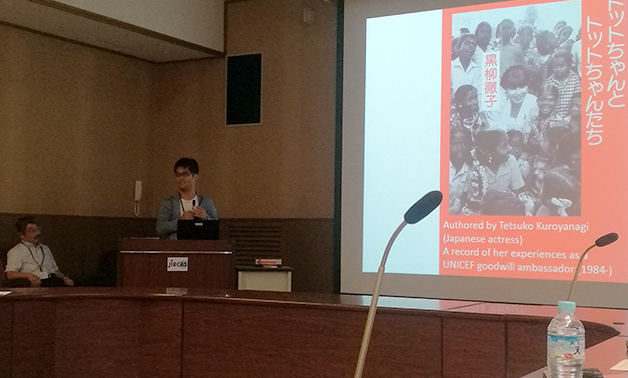
Yasuhiro TSUJIMOTO from JIRCAS Crop, Livestock, and Environment division during his Presentation July 3 at JIRCAS headquarters - EgyptToday/Aya Samir
"I am interested in Delta. If there is a chance to conduct research and do what we can do in this area, we are certainly interested in it," Yasuhiro told Egypt Today during his presentation at JIRCAS headquarters in Tsukuba.
He added that his project, entitled ‘FY VARY project,’ aims at the improvement of rice yield production under law fertilizer input and poor soil fertility environment in SSA. It was mainly conducted as a pilot experiment in Madagascar, and is scheduled to continue until 2022.
Replying to Egypt's Today question about JIRCAS researches in North African countries and especially Egypt in order to raise the production rate and quality, Yasuhiro said the institute is not currently conducting research in North Africa, especially with the existence of a nearby universities and institutes interested in conducting researches on Egypt's climate and agriculture conditions.
"We are not conducting current research in North Africa, as other universes are doing research. We are focusing more on doing what no one else has done before, especially in other African countries," Yasuhiro said.
The main challenge in Africa regarding agriculture is that consumption has been always higher than production. Yasuhiro explained that African countries rarely reach the needed levels of production due to several reasons. For example, rice production does not reach the needed level to meet the people staidly increasing needs.
The Food and Agriculture Organization of the United Nations (FAO) published a research on Rice production in Africa titled, ‘Rice production in Africa, current situation and issues.’ The study states that, "With the exception of a few countries that have attained self-sufficiency in rice production, rice demand exceeds production and large quantities of rice are imported to meet demand at a huge cost in hard currency".
According to FAO study, Africa consumes a total of 11.6 million tones of milled rice per year, of which 3.3 million tones (33.6 percent) is imported.
Egypt, in particular, has restrictions imposed on planting rice since the beginning of 2018 due to fears of water shortage. The government has decided to reduce the area of rice cultivation from 1 million feddans to 724 thousand feddans. Furthermore, planting rice was prohibited in certain governorates, including, Aswan, Luxor, Qena, Sohag, Assiut, Minya, Beni Suef, Fayoum, New Valley, Giza, Cairo, Qaliubiya, Menoufia, Marsa Matrouh, North Sinai, South Sinai and Red Sea.
According to reports, Nigeria was named the largest producer of rice in Africa, replacing Egypt which was known of being on top of Africa's production in this regard.
On March 2019, Egypt's government has announced raising the allowed area of rice cultivation, to be once again 1 million feddans, in order to reduce the import expenses for rice.
What is JIRCAS?
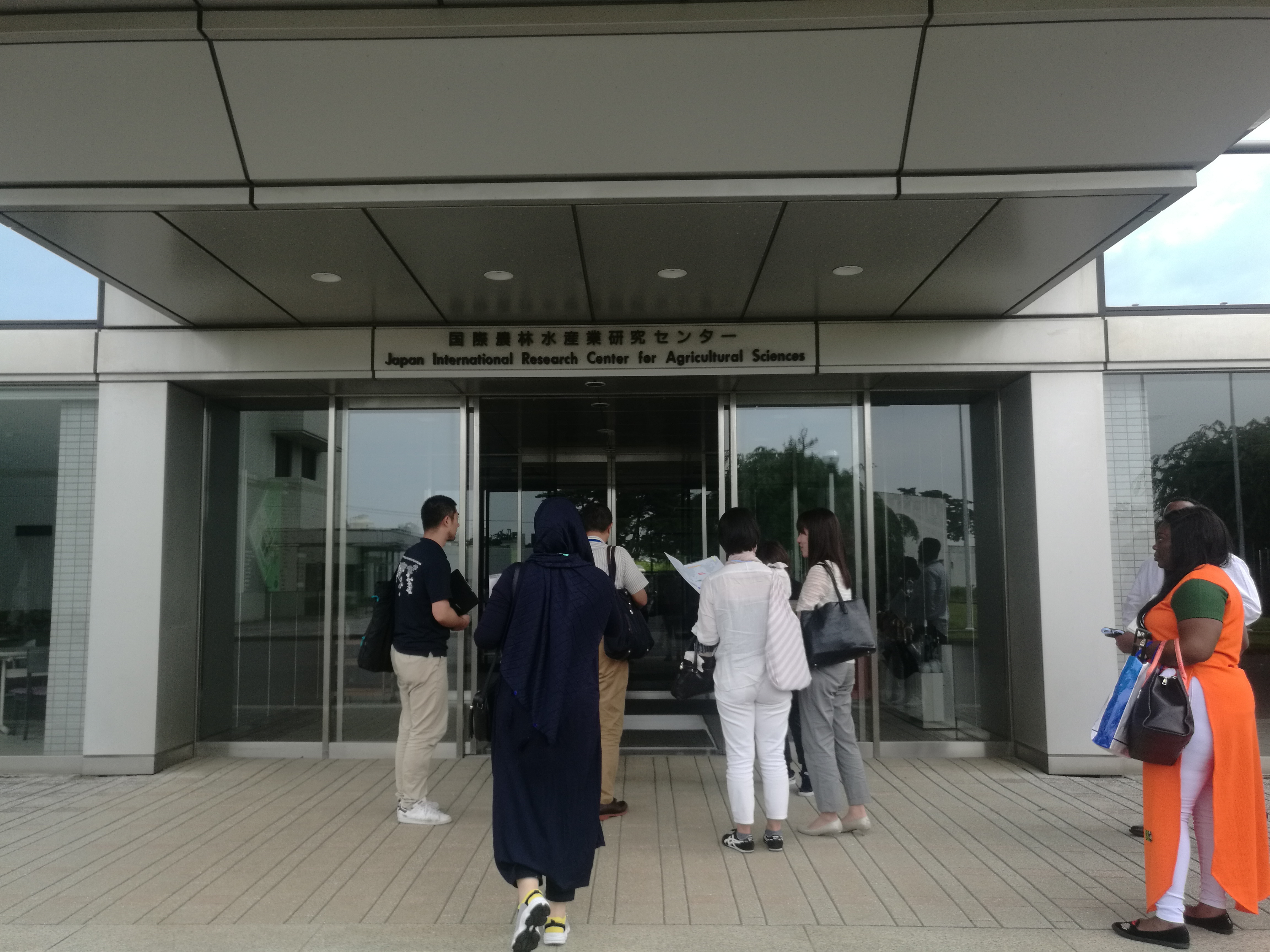
The Japanese International research Center for Agriculture Sciences (JIRCAS) headquarters - EgyptToday/Aya Samir
The Japanese International Research Center for Agriculture Sciences conducts researches to develop improved technologies for the agriculture, forestry and fishery industries in developing regions. It plays a central role in international contribution and cooperation initiatives in the field of agriculture, forestry and fishery research in Japan, with the aim of providing solutions to the global environmental problems, food insecurity, and extreme poverty.
The institute has a program for the African agriculture researches, called stable Agriculture production Program, of which it uses Technology development for stable Production of Agriculture projects in the tropics and other adverse regions. The Program has four main research projects in Africa, including (Food security, environmental stress-tolerant crops, highly yielding biomass crops, and past and disease control.)
Kazuo Nakashima, Director of Stable Agricultural Production Program in JIRCAS explains that Trans-boundary plant pests are the biggest threats to global food security. They are responsible for 20-40 percent of losses in global food production. Even the climate change and globalize movement of people and goods worsening the damage that creates global public concern across all countries and regions.
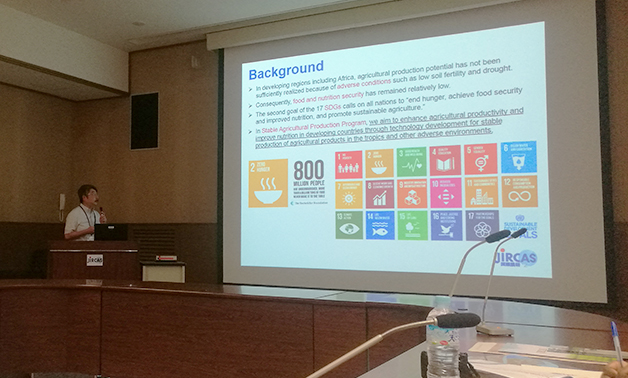
Kazuo Nakashima, Director of Stable Agricultural Production Program in JIRCAS during a presentation July 3- EgyptToday/Aya Samir
He added that the project as well aims at creating and developing technologies to define resistance and to utilize the diseases leading to creating crops stability.
Nakashima also referred to the genetically modified technology research (GMOs), saying that JIRCAS used to make research on this regard in Brazil. The research was about resistant to less water environment. The studies also include dry environments. However, the GMOs related projects are now finished and the results were mainly aiming at raising the quality of the products. Brazil announced that it would continue research on this regard based on the information that was provided because of JIRCAS research.
"As long as GMOs results are aiding the countries production and backing nations, them we believe that these researches are for the favor of agriculture," Nakashima said in his presentation. He added that JIRCAS do not seek approval from the Japanese government before sharing the information with other countries.
During JIRCAS coming phase of research that will start by April 2021, they are seeking to collect information from a number of countries to understand their agriculture situation and analyze the date with goals to contribute in developing technologies that will aid achieving food safety and stable food production.
JIRCAS works under the Japanese ministry of agriculture forestry and fisheries, with a total budget of 250M Japanese yen, and in collaboration with the Japan International Cooperation Agency (JICA).
How TICAD7 will be tacking agriculture?
The 2019 Tokyo International Conference on African Development (TICAD7), which will be held on August 28 in Yokohoma city expected to tackle agriculture and its challenges in the African Countries, as food security considers to be one of the major disturbing threats that face the continent.
The director general of JICA Tsukuba International Center, Takeshi WATANABE said in another speech at JICA Tsukuba headquarter, July 2 that agriculture will be one of the main issued tackled in TICAD 7. The discussions that will be taking place require the Japanese officials to understand fully the needs of every African country on this regard, and what they can offer to it based on real studies.
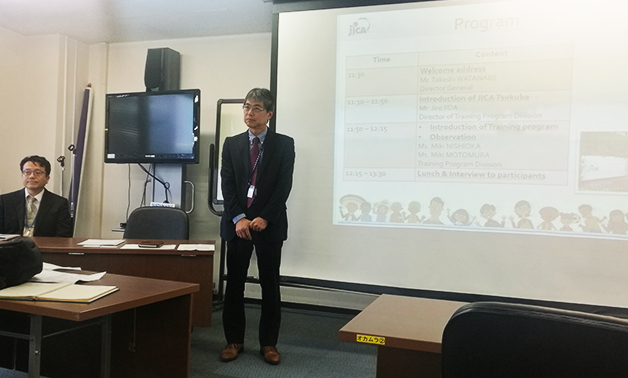
Director general of JICA Tsukuba International Center, Takeshi WATANABE- July 3, 2019, EgyptToday/Aya Samir
JICA Tsukuba manager for the training program division, Jiro IIDA shed light on the African trainees who spend up to seven months in the center in order to learn about Japan's developing agriculture technologies and taking it back to their countries. Nearly one-third of JICA Tsukuba trainees are from Africa.
Egypt Today met with Mohamed Salah. An Egyptian Trainee who is currently in the sixth month of his training program. Salah applied for the Irrigation of drainage technology based on IWRM program and came to JICA Tsukuba, nearly five months ago. He is due to end his program in next September.
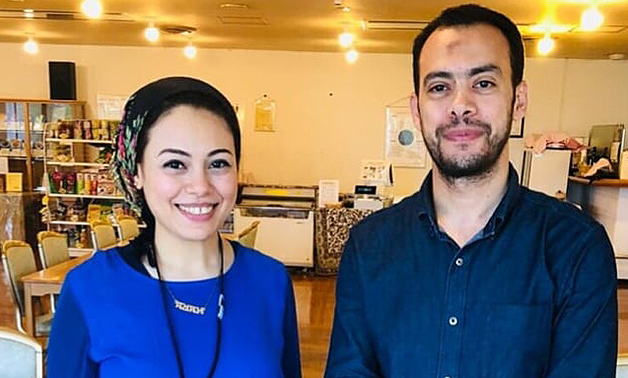
JICA Tsukuba Egyptian Trainee Mohamed Salah and Egypt Today reporter on July 3 - EgyptToday/Aya Samir
"Here we are studying everything related to Irrigation. We are responsible for studying and dividing the agricultural land with the nature of the crop that will be cultivated." Salah said. He added that the study here includes regular lectures, exams, and evaluations.
Back in Egypt, Salah holds the position of Business Manager at the Ministry of Water Resources and Irrigation. He got his masters in Air Resources earlier in 2019.
JICA Tsukuba has been providing courses and training since fifty years ago. On their walls, they are hanging commemorative photographs for previous patches that arrived in Japan to participate in their training from all over the world.
Along with Salah, Egypt Today found a photo for another Egyptian in 2000's patch called el-Sayed Mohamed Awad, who participated in the vegetable cultivation technology course.
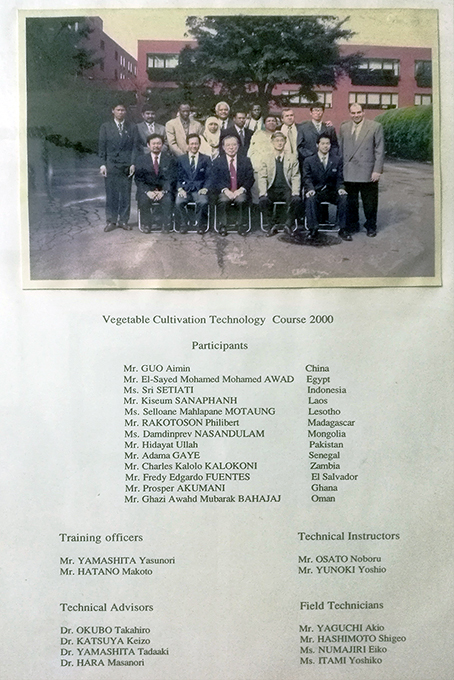
JICA Tsukuba 2000 patch hanged on the building memorial corridor on July 3 - EgyptToday/Aya Samir
Smart farming in Africa?
Using technologies and new machines have been always promoted to be savers for time, money and human resources that could be wasted in using old methods. However, how far could African countries be able to share these technologies with Japan is something that needs real studies to be answered.
Egypt Today visited ISEKI Manufacturing Company, which considers being the third largest Japanese agricultural machinery manufacturing company. ISEKI provides sophisticated machinery with relatively highly coasted prices. However, these machinery replace human powers with the highest technologies and accuracies.
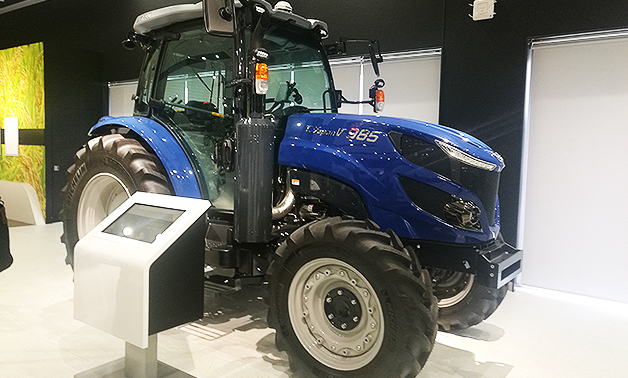
Robot Tractor TJV655 - manufactured by ISEKI, July 3 - EgyptToday/Aya Samir
According to ISEKI officials, General Manager Katsushi MIWADA and Head of the Public and Investor Relations Section Akari MATOBA, the prices are 1.6 times higher than the conventional agriculture machines. It depends on Diesel fuel due to its huge size. It contains sensors for security, GPS and automatic drivers. These machines guarantee safety and high-quality products. Some of the pieces of machinery are even considered a revolution in the agriculture field and first in the market. Many advantages with an uncertain decision if this machinery is compatible with Africa's agriculture conditions and economic situation.
According to ISEKI officials, some of these machines could be given to African countries through ODA loans, as it happened in Kenya and other countries in cooperation with JICA. However, the decision on this remains only to be answered by each African country own situation, studies and decision.
CAIRO - 26 June 2019: During the Cold war, most of the powerful countries were interested to invest in Africa to increase their influence and enhance their authority in the region which was an indirect war area same as the whole world back then.
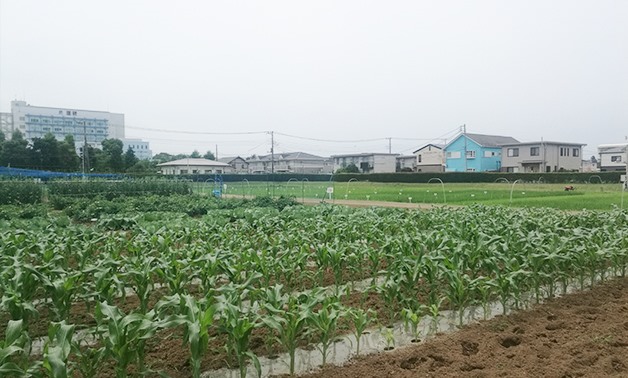







Comments
Leave a Comment